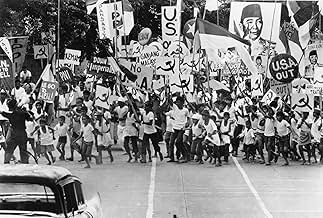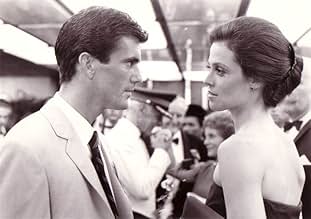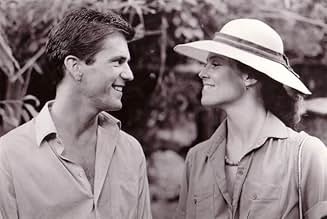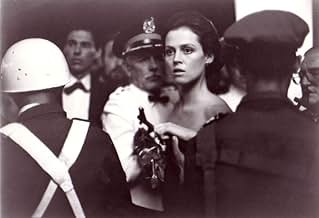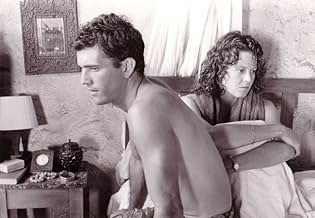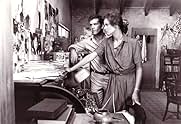IMDb रेटिंग
7.1/10
24 हज़ार
आपकी रेटिंग
एक युवा ऑस्ट्रेलियाई रिपोर्टर ने राष्ट्रपति सुकर्णो के शासन के दौरान इंडोनेशिया के राजनीतिक उथल-पुथल को नेविगेट करने की कोशिश की, जिसमें एक कम उम्र के फोटोग्राफर की मदद ली गई.एक युवा ऑस्ट्रेलियाई रिपोर्टर ने राष्ट्रपति सुकर्णो के शासन के दौरान इंडोनेशिया के राजनीतिक उथल-पुथल को नेविगेट करने की कोशिश की, जिसमें एक कम उम्र के फोटोग्राफर की मदद ली गई.एक युवा ऑस्ट्रेलियाई रिपोर्टर ने राष्ट्रपति सुकर्णो के शासन के दौरान इंडोनेशिया के राजनीतिक उथल-पुथल को नेविगेट करने की कोशिश की, जिसमें एक कम उम्र के फोटोग्राफर की मदद ली गई.
- 1 ऑस्कर जीते
- 10 जीत और कुल 14 नामांकन
फ़ीचर्ड समीक्षाएं
15 years after its release, I finally get to see what to my knowledge is the only english-speaking film that tells the story of Indonesia circa the 1965 revolution.
A very young Gibson is convincing as the inexperienced but ambitious reported determined to make his mark in telling the story of Sukarno's last moments in power. Equally brilliant is Sigourney Weaver, and yet one feels that this film did not give her the opportunity to show her true calibre.
The one who ultimately steals the show, then, is Linda Hunt, playing the enigmatic and passionate Billy, who understands the true psyche of Indonesia better than any of the other foreign characters in this story.
When Billy solemnly expresses his disappointment to Guy, proclaiming, "I created you", it evoked images of Weir's latest masterpiece, The Truman Show, where Christof has fashioned the persona of Truman Burbank for his TV spectacle. Perhaps a running theme in Peter Weir's work? Must check out...
I marvelled at the authenticity of the setting. It certainly looked like Jakarta. The faces, the atmosphere, the buildings, and yet, those scenes were shot in the Philippines, with mainly Filipino actors! Just goes to show the similarity among Indonesia and the Philippines.
I see now why this film was never made available in Indonesia (to my knowledge). The last few moments of the film show the stark reality of communist executions by Soeharto's new military regime, horrifying pictures of mere pawns being slaughtered... and the parting message from a self-confessed PKI member:"Am I stupid for wanting to change my country's condition?" is one of the best lines in this film.
A very young Gibson is convincing as the inexperienced but ambitious reported determined to make his mark in telling the story of Sukarno's last moments in power. Equally brilliant is Sigourney Weaver, and yet one feels that this film did not give her the opportunity to show her true calibre.
The one who ultimately steals the show, then, is Linda Hunt, playing the enigmatic and passionate Billy, who understands the true psyche of Indonesia better than any of the other foreign characters in this story.
When Billy solemnly expresses his disappointment to Guy, proclaiming, "I created you", it evoked images of Weir's latest masterpiece, The Truman Show, where Christof has fashioned the persona of Truman Burbank for his TV spectacle. Perhaps a running theme in Peter Weir's work? Must check out...
I marvelled at the authenticity of the setting. It certainly looked like Jakarta. The faces, the atmosphere, the buildings, and yet, those scenes were shot in the Philippines, with mainly Filipino actors! Just goes to show the similarity among Indonesia and the Philippines.
I see now why this film was never made available in Indonesia (to my knowledge). The last few moments of the film show the stark reality of communist executions by Soeharto's new military regime, horrifying pictures of mere pawns being slaughtered... and the parting message from a self-confessed PKI member:"Am I stupid for wanting to change my country's condition?" is one of the best lines in this film.
I had forgotten what it is to inhabit the frame, that is to be immersed not only in the world these characters experience but in the sensations made available in it. To feel a draught of air or the scorching heat.
Peter Weir here in his best period reminds me again. His fascination in this period with the otherworldly is firstly Australian, that of a man awed by the mysteries of an alien, ancient landscape that trumps comprehension, outlasts our follies and dreams, then foremostly mystical, implying a communion with worlds beyond.
In this world answers are denied us, and we can only hear vague echoes of the questions we have asked. This is Picnic at Hanging Rock as well as The Last Wave and The Year of Living Dangerously, the tingle of excitement and fear before this enormous complexity to which we are only small and transient. The Hanging Rock here becomes Jakarta.
These visions of Jakarta, a veritable jungle of humanity teeming with passions and cruelties, he presents from a point of view that communicates alienation and fear. When our white characters venture out into the crowded slums, human misery reaches out at them with filthy gaunt arms. All this he doesn't merely document for the sake of political discourse, he stylizes as an experience meant to stir things in the soul. This also outlines Weir's limitations; that these visions are perhaps too tawdry, the savages noble and the gnomes magical.
All this in mind, the film is best experienced for me as a spiritual journey. But towards what?
A dwarf is our guide through this, an ominpresent being that seems to create the story we are watching, an avatar of the filmmaker's consciousness. He narrates our hero's arrival, then makes him see his limits by offering him his folly, the desire for an exclusive story. In a poignant scene early in the film, holding shadow puppets before a canvas screen, he reveals to him a fundamental tenet of Buddhist thought. How desire clouds the soul so that reality itself becomes concave.
This is not always perfect of course, Peter Weir is no Antonioni after all. Our hero eventually gives up the big scoop to pursue love, but this is accomplished through violence perpetrated to him rather than a personal realization that comes from having experienced the folly of the mind (which Antonioni brilliantly dismantles for us in Blowup). Lying halfdead on a filthy bed somewhere in Jakarta, he remembers the wise words of how desire blinds the soul, but is none the wiser.
He doesn't willingly give up anything, which is to say even if his precious tape recorder (the tool by which he records the world, seeking "truth") is snatched from him in the airport at the last moment, he has essentially lost nothing that he doesn't carry inside of him.
Perhaps this is the film's apogee then, that faced with a chaos and violence which outlasts them and reveals them to be small and diminutive, mere specs of sand in the cosmic beach, the characters of the film stubbornly remain the same, having brushed off that encounter only as an exciting, dangerous escapade into the dark side.
The weather reflects that chaos in Weir's films, acting as an agent of transience whereby the world is shown to be in constant flux and motion. But the characters are phazed little by this, anxious to pursue their desires and enact their little charades of meaning. When a tropic downpour suddenly rains down on them, they laugh and play in it.
But if Weir's fascination with the mystical is entirely white Australian, his cinema is elemental, Aboriginal. Here is the communion made possible.
The fact that he unerringly insists to submerge his characters in these impenetrable worlds that defy understanding, where the sole reward is a moment's glimpse of the soul in spiritual hazard, means that the glimpse is reward enough because for that moment the apparent reality is peeled back to afford us a gaze into a yawning universe beyond. This yearning for the mechanisms of the universe to be made apparent is in itself the primal, ultimate urge of these films. The Last Wave takes us on the brink and gives us a vision of apocalypse (a revelation), this one stops just short of that.
Peter Weir here in his best period reminds me again. His fascination in this period with the otherworldly is firstly Australian, that of a man awed by the mysteries of an alien, ancient landscape that trumps comprehension, outlasts our follies and dreams, then foremostly mystical, implying a communion with worlds beyond.
In this world answers are denied us, and we can only hear vague echoes of the questions we have asked. This is Picnic at Hanging Rock as well as The Last Wave and The Year of Living Dangerously, the tingle of excitement and fear before this enormous complexity to which we are only small and transient. The Hanging Rock here becomes Jakarta.
These visions of Jakarta, a veritable jungle of humanity teeming with passions and cruelties, he presents from a point of view that communicates alienation and fear. When our white characters venture out into the crowded slums, human misery reaches out at them with filthy gaunt arms. All this he doesn't merely document for the sake of political discourse, he stylizes as an experience meant to stir things in the soul. This also outlines Weir's limitations; that these visions are perhaps too tawdry, the savages noble and the gnomes magical.
All this in mind, the film is best experienced for me as a spiritual journey. But towards what?
A dwarf is our guide through this, an ominpresent being that seems to create the story we are watching, an avatar of the filmmaker's consciousness. He narrates our hero's arrival, then makes him see his limits by offering him his folly, the desire for an exclusive story. In a poignant scene early in the film, holding shadow puppets before a canvas screen, he reveals to him a fundamental tenet of Buddhist thought. How desire clouds the soul so that reality itself becomes concave.
This is not always perfect of course, Peter Weir is no Antonioni after all. Our hero eventually gives up the big scoop to pursue love, but this is accomplished through violence perpetrated to him rather than a personal realization that comes from having experienced the folly of the mind (which Antonioni brilliantly dismantles for us in Blowup). Lying halfdead on a filthy bed somewhere in Jakarta, he remembers the wise words of how desire blinds the soul, but is none the wiser.
He doesn't willingly give up anything, which is to say even if his precious tape recorder (the tool by which he records the world, seeking "truth") is snatched from him in the airport at the last moment, he has essentially lost nothing that he doesn't carry inside of him.
Perhaps this is the film's apogee then, that faced with a chaos and violence which outlasts them and reveals them to be small and diminutive, mere specs of sand in the cosmic beach, the characters of the film stubbornly remain the same, having brushed off that encounter only as an exciting, dangerous escapade into the dark side.
The weather reflects that chaos in Weir's films, acting as an agent of transience whereby the world is shown to be in constant flux and motion. But the characters are phazed little by this, anxious to pursue their desires and enact their little charades of meaning. When a tropic downpour suddenly rains down on them, they laugh and play in it.
But if Weir's fascination with the mystical is entirely white Australian, his cinema is elemental, Aboriginal. Here is the communion made possible.
The fact that he unerringly insists to submerge his characters in these impenetrable worlds that defy understanding, where the sole reward is a moment's glimpse of the soul in spiritual hazard, means that the glimpse is reward enough because for that moment the apparent reality is peeled back to afford us a gaze into a yawning universe beyond. This yearning for the mechanisms of the universe to be made apparent is in itself the primal, ultimate urge of these films. The Last Wave takes us on the brink and gives us a vision of apocalypse (a revelation), this one stops just short of that.
One of the most perfect movies ever made. A true slice of life - what art is supposed to be all about. The music is extraordinary - note how Jarre uses it (and I will say no more for fear of spoiling the effect). No, this wasn't filmed on location, but I don't think that should matter, as the ability of the film to evoke a place and a period is remarkable. I first saw this movie by chance; I have owned it ever since. It's one of these rare movies that are made as an artist is climbing upwards in career but not yet devoured by the commercial interests who will notice and try to effect a lucrative transformation.
It's 1965 Jakarta in Indonesia under the brutal rule of President Sukarno. Guy Hamilton (Mel Gibson) is on his first foreign assignment for the Australian Broadcasting Service. He is befriended by photographer half-Chinese dwarf Billy Kwan (Linda Hunt). There is an air of anti-western feeling. Guy is lost without connections until Billy starts helping him out. He has an affair with British diplomat Jill Bryant (Sigourney Weaver). It's a world of murky Cold War politics, secrets and trying morality.
This has a great exotic atmosphere. The movie has a sense of impending doom. Mel Gibson is terrific and shows his superior star power. Linda Hunt creates such a compelling character. It does need to heighten the tension a little. The plot meanders in this murky world. It needs a direction. Nevertheless I just love the dark exotic mood.
This has a great exotic atmosphere. The movie has a sense of impending doom. Mel Gibson is terrific and shows his superior star power. Linda Hunt creates such a compelling character. It does need to heighten the tension a little. The plot meanders in this murky world. It needs a direction. Nevertheless I just love the dark exotic mood.
In "The Year of Living Dangerously" director Peter Weir attempts much and accomplishes most of his goals. It's a socio-political essay on the dangers of Western meddling in Third World countries. It's a fascinating view into the challenges of journalism in a volatile foreign country. It's a steamy romance involving two beautiful, intelligent characters. It's a distinctly Far Eastern morality play that seems to delight in yin/yang paradoxes. Plus it's one of the best films at evoking the mood, texture, and sensuality of life in Southeast Asia. Don't be too harsh on Weir for the lapses in historic accuracy and plotting, because it's a complicated, busy landscape he is painting here. The best things about the film are:
-Linda Hunt's amazing performance. Unlike other gender-bending performances (Julie Andrews in "Victor/Victoria", Dustin Hoffman in "Tootsie") you never once give any thought to the fact that this is a woman playing a man. It's a seamless transition and a performance of immense heart and honesty. The image of a distraught Billy pounding at his typewriter, pleading "What then must we do?" while an aria swells around him and the eyes of Jakarta's poor stare at him from his own photographs, is an incredibly moving scene.
-The atmosphere created by the combination of Russell Boyd's cinematography and Maurice Jarre's score. Take a look at the scene with Weaver walking through the streets of Jakarta in a tropical downpour. The effect is breathtaking.
-The chemistry between Gibson and Weaver. You can feel the heat between them. Unlike other posters here, I believe their romance is one of the film's strong points.
I agree that the ending is a bit of a letdown, but it doesn't diminish Weir's accomplishments. "The Year of Living Dangerously" is a startling unique film, and certainly one his best.
-Linda Hunt's amazing performance. Unlike other gender-bending performances (Julie Andrews in "Victor/Victoria", Dustin Hoffman in "Tootsie") you never once give any thought to the fact that this is a woman playing a man. It's a seamless transition and a performance of immense heart and honesty. The image of a distraught Billy pounding at his typewriter, pleading "What then must we do?" while an aria swells around him and the eyes of Jakarta's poor stare at him from his own photographs, is an incredibly moving scene.
-The atmosphere created by the combination of Russell Boyd's cinematography and Maurice Jarre's score. Take a look at the scene with Weaver walking through the streets of Jakarta in a tropical downpour. The effect is breathtaking.
-The chemistry between Gibson and Weaver. You can feel the heat between them. Unlike other posters here, I believe their romance is one of the film's strong points.
I agree that the ending is a bit of a letdown, but it doesn't diminish Weir's accomplishments. "The Year of Living Dangerously" is a startling unique film, and certainly one his best.
क्या आपको पता है
- ट्रिवियाDirector Peter Weir cast Linda Hunt in the role of Billy Kwan after failing to find an actor who could play the part the way he wanted.
- गूफ़Billy's still camera is a Nikon F2 Photomic, which was not released until 1971, while the film takes place in 1965.
- भाव
Billy Kwan: What then must we do? We must give with love to whoever God has placed in our path.
- कनेक्शनFeatured in Peter Weir Industry Seminar 1989 (1989)
- साउंडट्रैकBeim Schlafengehen
from "Four Last Songs"
by Richard Strauss
Performed by Kiri Te Kanawa and London Symphony Orchestra
Conducted by Andrew Davis
Courtesy of CBS Masterworks
Published by Boosey-Hawkes
टॉप पसंद
रेटिंग देने के लिए साइन-इन करें और वैयक्तिकृत सुझावों के लिए वॉचलिस्ट करें
- How long is The Year of Living Dangerously?Alexa द्वारा संचालित
विवरण
- रिलीज़ की तारीख़
- कंट्री ऑफ़ ओरिजिन
- भाषाएं
- इस रूप में भी जाना जाता है
- El año que vivimos en peligro
- फ़िल्माने की जगहें
- उत्पादन कंपनियां
- IMDbPro पर और कंपनी क्रेडिट देखें
बॉक्स ऑफ़िस
- बजट
- $1,30,00,000(अनुमानित)
- US और कनाडा में सकल
- $1,02,78,575
- US और कनाडा में पहले सप्ताह में कुल कमाई
- $35,000
- 23 जन॰ 1983
- दुनिया भर में सकल
- $1,02,78,575
इस पेज में योगदान दें
किसी बदलाव का सुझाव दें या अनुपलब्ध कॉन्टेंट जोड़ें

